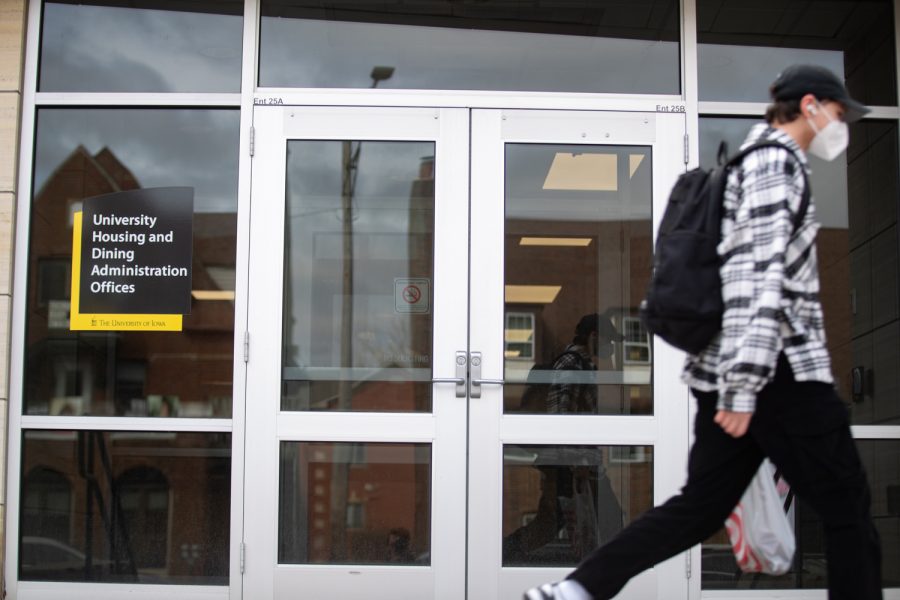UI to request approval for residence hall rate increase
The University of Iowa will request approval to increase the current residence hall rates by 3 percent at the upcoming state Board of Regents meeting, which would apply to the 2022-23 academic year.
A student walks past the University Housing and Dining Administration Offices in Iowa City on Monday, April 4, 2022.
April 5, 2022
The University of Iowa is looking to increase residence hall rates by 3 percent for the 2022-23 academic year.
The university is requesting approval for the increased rates from the state Board of Regents at its upcoming meeting on April 7. Upon approval, the rate increase would apply to the 2022-23 school year and summer 2023 housing.
Additionally, the 3 percent increase applies to the meal plans currently offered at the UI:
- The Gold (unlimited number of dining hall meals) meal plan would increase from $3,955 to $4,075.
- The Black (220 dining hall meals per semester) meal plan would increase from $3,565 to $3,672.
- The Hawkeye (75 dining hall meals per semester) meal plan would increase from $1,530 to $1,576.
The document states that the current prices for Hawkeye Dollars, the one-time housing application fee, and university-affiliated guest rates will remain the same.
The request for approval from the regents comes after the university proposed the increase at the February regents meeting. At the meeting, Von Stange, UI assistant vice president for student life and senior director of university housing and dining, said the university’s support has helped keep rate increases low.
“The university has continued to support our departments and our students during the pandemic, allowing us to meet our obligations to our students and our bondholders,” Stange said. “Without their support, we wouldn’t be able to limit our room and board increases next year to 3 percent while inflation might suggest higher rates.”
The residence system governance report, presented to the regents at its February meeting, states that the proposed increase is based on multiple factors including needed infrastructure improvements, estimated operating costs, available capacity, and the debt service requirements.
Related: University of Iowa to request approval of business analytics, translation degree programs
“Each residence system operates in a unique competitive environment with individual capital and operational needs,” the document outlines.
The report details that the fiscal 2023 budgets were developed considering the expected number of occupants in the dorms, purchased meal plans, estimated operating cost increases, projected infrastructure improvements, and the debt service requirements of the residence halls.
Additionally, the pandemic’s impact reduced residence hall occupancy to approximately 80 percent of capacity in each of the regent institution residence systems, the document outlines.
The UI intends to increase its occupancy ratio to:
- 7 percent in fiscal 2022
- 91 percent in fiscal 2023
- 7 percent in fiscal 2025
UI first-year Amelia Spahn currently lives in Mayflower Hall. Spahn, who is living in the dorms for the 2022-2023 academic year, said she chose to live in the dorms again because it is more convenient than finding an apartment.
“I knew what it was like to live here, and it was a reasonable price considering the amenities included,” Spahn said. “I like the community, and I like how it’s close to campus. You get the Cambus and everything.”
Part of the reason Spahn chose to return to Mayflower Hall was that she found it was more financially sustainable.
“The price of living here is a cheaper price than finding an apartment that’s potentially farther away, where you have to pay for gas as you don’t have the Cambus, and you’d have to pay for water and electricity and all that, where here, it’s all already included in the price,” Spahn said.
Spahn said the potential rate increase has diminished her desire to live in the dorms for a second year.
“If I wasn’t already in the contract, it would be another reason why I would try to look for apartments more seriously,” Spahn said. “But with a price increase, it would be like, ‘Oh, I could get something better for the same price.’”




